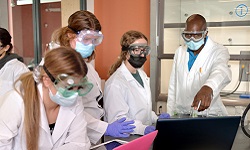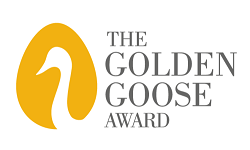 Three Researchers at AAU Institutions Honored with Nobel Prizes
Three Researchers at AAU Institutions Honored with Nobel Prizes
Congratulations to the three AAU member universities whose faculty have been awarded Nobel Prizes this year. Stanford University’s Baker Family Director of Stanford ChEM-H Carolyn Bertozzi shared the Nobel Prize in Chemistry for developing the fields of click chemistry and bioorthogonal chemistry, which have allowed researchers to build molecules and better understand chemical reactions in living things. The research is helping scientists develop new drugs to treat cancer.
Boatmen’s Bancshares Professor of Banking and Finance Philip H. Dybvig at Washington University in St. Louis and Merton H. Miller Distinguished Service Professor of Finance Douglas W. Diamond at the University of Chicago shared the Nobel Prize in Economic Sciences for research on banks and financial crises.
 AAU Launches Learning Community on Evaluating Effective and Equitable Teaching at Research Universities
AAU Launches Learning Community on Evaluating Effective and Equitable Teaching at Research Universities
Earlier this week, AAU launched a learning community on evaluating effective and equitable teaching at research universities. The learning community brings together department chairs, faculty, and administrative leaders from 18 AAU campuses to discuss how institutions can implement more effective and holistic teaching evaluation models that focus on the use of teaching practices proven to maximize student engagement and learning. The learning community will also explore how institutions can create better systems to recognize and reward evidence-based and equitable teaching practices. More information about the institutions involved in the learning community and their efforts to rethink teaching evaluation can be found here.
The learning community and AAU’s ongoing work to improve undergraduate teaching evaluation is supported by funds from the Howard Hughes Medical Institute and the Sarah Gilbert & Carl Weiman Charitable Fund.
 White House Previews Student Loan Forgiveness Application
White House Previews Student Loan Forgiveness Application
Earlier this week, the White House previewed the application that borrowers would have to fill out in order to receive federal student loan debt relief. The application will not require any supporting documents and will be available in English and Spanish on both mobile and desktop devices. The application period is expected to open later this month and run through the end of the year. The debt relief plan includes cancellation of up to $20,000 in debt for borrowers who received Pell Grants in college and up to $10,000 in debt for borrowers who did not receive Pell Grants. More information about the debt relief program can be found at studentaid.gov/debt-relief-announcement/.
 Annual Defense Bill Advances in the Senate
Annual Defense Bill Advances in the Senate
Earlier this week, the Senate advanced the annual defense policy bill, bringing the must-pass legislation closer to the president’s desk.
The chamber came into session briefly on Tuesday for a procedural action to advance its version of the FY23 National Defense Authorization Act and file a manager’s amendment by unanimous consent. Although lawmakers initially submitted more than 950 amendments to the legislation, the manager’s package included only 75. The package did not include any of the immigration or research security proposals AAU had been monitoring.
The next Senate votes are scheduled for November 14 following the midterm elections. The House passed its version of the legislation (H.R. 7900), authorizing $840.2 billion for defense programs, in July.
Task Force on American Innovation Urges Increased Funding Levels for DOE Office of Science in FY24
On Wednesday, the Task Force on American Innovation (an alliance of industry, professional societies, and university organizations, including AAU) sent a letter to Energy Secretary Jennifer Granholm and Office of Management and Budget Director Shalanda Young urging them to increase investments in the Department of Energy Office of Science in FY24.
As the letter explained, the DOE Office of Science is “America’s largest supporter of research in the physical sciences,” especially research on clean energy and decarbonization. The letter urged Granholm and Young to seek funding for the DOE Office of Science in FY24 at the levels authorized in the bipartisan CHIPS and Science Act. “This level of investment,” the letter noted, “is necessary to expand and accelerate American research and development in key focus areas where U.S. leadership is critical.”
TFAI also plans to reach out to heads of other science agencies and advocate for increased funding levels for research and development in FY24.
 ICYMI: Barbara’s Blog: Making America Competitive Again
ICYMI: Barbara’s Blog: Making America Competitive Again
 Submit Nominations for the 2023 Golden Goose Award
Submit Nominations for the 2023 Golden Goose Award
Nominate your colleagues, collaborators, or role models for a 2023 Golden Goose Award! The Golden Goose Award honors federally funded researchers whose work may sound silly, odd, obscure, wasteful of taxpayer funding, or serendipitous, but which has had a major positive impact on society. This year, the award went to three teams of researchers whose work led to bladeless LASIK, a low-cost foldable paper microscope, and a non-opioid pain reliever. Learn more about the previous awardees here.
Nominations for the Golden Goose Award are accepted on a rolling basis, but submissions received through December 16 will have the best chance to be considered for the 2023 award. Nominations submitted after that date will be considered for an award in future years. For more information about the Golden Goose Award, please visit goldengooseaward.org.
News of Interest
Lansing State Journal: Michigan State President Samuel Stanley Resigns, Cites Loss of Confidence in Board – Michigan State University President Samuel Stanley Jr. resigned yesterday, saying that he had “lost confidence” in the university’s current board of trustees, and that he could not “in good conscience continue to serve” the board. AAU President Barbara R. Snyder had issued a statement last month expressing concern about the trustees’ interference in school operations.
Oregon Public Broadcasting: University of Oregon and Eastern Oregon University Announce Programs Supporting Native American Students – The University of Oregon announced a new program to support Native American students who are Oregon residents and enrolled in any one of the state’s 574 federally recognized tribes. Starting immediately, the university’s Home Flight Scholars Program will cover full tuition and fees and provide mentorship and other academic support to eligible students.
The Washington Post: A Deadline Is Looming for Public Service Loan Forgiveness Waiver – The Public Service Loan Forgiveness program is designed to help discharge the debt of borrowers who choose careers in public service and make qualifying payments under the program. Until October 31, borrowers can apply for “a waiver to receive credit for payments that previously did not qualify for PSLF.”
NPR: Ben Sasse Is the Sole Finalist to Become the Next University of Florida President – The University of Florida announced that a search committee has unanimously recommended Republican Senator Ben Sasse from Nebraska to serve as the university’s next president.
The Wall Street Journal: China’s Universities Rise in World Rankings as American Schools Continue to Falter – This year’s World University Rankings by Times Higher Education included only 34 universities from the United States in its list of top 100 universities around the world; in 2018, 43 U.S. universities were represented. At the same time, the number of Chinese universities in the top 100 increased from two to seven. A recent study also found that “China has overtaken the U.S. as the world leader in scientific research output.” Declining federal support for research and development in the United States is partly to blame for the reversing trend. “The U.S. cannot take our competitive edge for granted,” said AAU President Snyder, adding: “The rest of the world is not standing still.”
CNN: Stanford University Apologizes for Limiting Jewish Student Admissions During the 1950s – In a letter, Stanford University President Marc Tessier-Lavigne apologized to the Jewish community and the broader Standford community for actions the university took in the 1950s “to suppress the admission of Jewish students” and “for the university’s denials of those actions in the period that followed.”
The Chronicle of Higher Education: Number of New Chinese Students at U.S. Colleges Plummeted This Fall, Visa Data Show – New data show that more students from India were issued visas to attend U.S. universities this fall than students from China. Pandemic disruptions, rising geopolitical tensions, and concerns that the United States is no longer a “safe and welcoming destination” are some of the reasons for the declining interest in a U.S. education among Chinese students.
Featured Research

Sustainable Suds: New UMD Project Brings Green Practices to Microbreweries
Brewing one gallon of beer can take up to seven gallons of water. In addition, waste produced during the beermaking process can place heavy burdens on wastewater treatment plants. Now a new project at the University of Maryland is working with craft brewers to research and implement “cost-saving strategies to reduce water, energy and chemicals” in microbrewery operations, helping them become sustainable and green.

Twitter Gives Conservative Views Greater Visibility Than Liberal Content
A team of researchers from the University of Pennsylvania, the University of North Carolina at Chapel Hill, and Italy’s University of Padua and Fondazione Bruno Kessler analyzed Twitter data and found that politically conservative views are more visible on the social media platform than liberal ones. The bias held even in the context of discussions on progressive movements like Black Lives Matter.
Upcoming Events
 The Asian American Scholar Forum is hosting a webinar on October 17 at 3:00 p.m. ET on a recent report highlighting the negative effects of the federal government’s efforts to curb Chinese economic espionage on scientists of Chinese descent in the United States. The report shows that many scientists of Chinese descent feel pressured by threats of potential federal investigations and are, as a result, either considering leaving the United States or avoiding applying for federal research grants.
The Asian American Scholar Forum is hosting a webinar on October 17 at 3:00 p.m. ET on a recent report highlighting the negative effects of the federal government’s efforts to curb Chinese economic espionage on scientists of Chinese descent in the United States. The report shows that many scientists of Chinese descent feel pressured by threats of potential federal investigations and are, as a result, either considering leaving the United States or avoiding applying for federal research grants.
Panelists include Rep. Judy Chu (D-CA), AAU Senior Vice President for Science Policy and Global Affairs Tobin Smith, and others. More information about the webinar, including on how to register, is available on the AASF website.
Stat of the Week

The Public Trusts America’s Leading Research Universities to Find Cures for Serious Diseases
America’s leading research universities are at the forefront of the battle against diseases such as cancer, diabetes, and Alzheimer’s. The American public recognizes the universities’ efforts and trusts them to help find treatments. A recent AAU study showed that 71% of Americans trust America’s leading research universities to find cures for these life-altering diseases – a far larger share of the public than those who said they trusted government agencies like the National Institutes of Health to help find cures (33%); those who trusted researchers in foreign countries (32%); those who cited pharmaceutical companies like Pfizer and Moderna (29%); and those who said they trusted hospitals (25%).